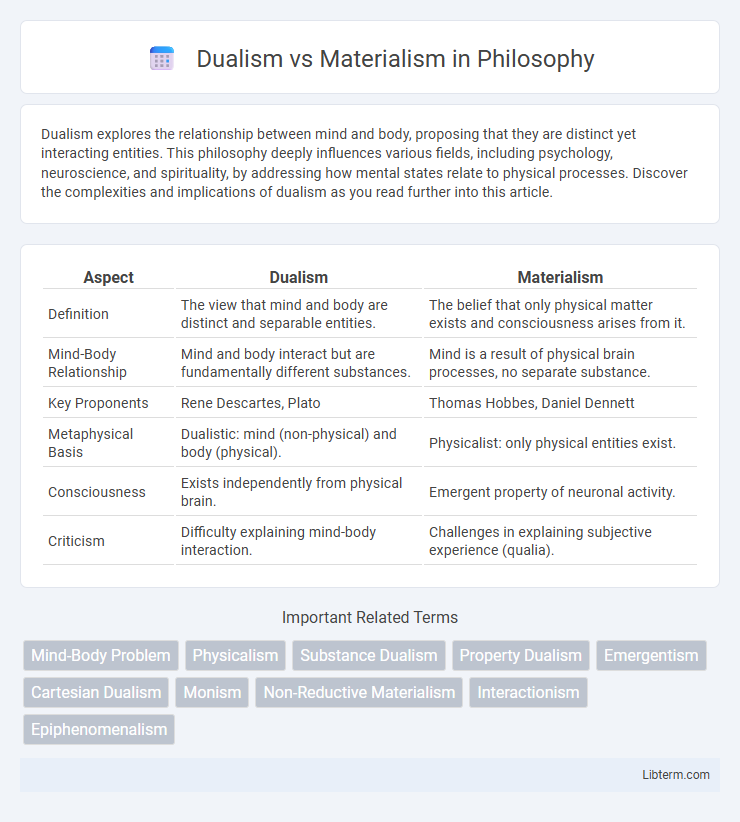Dualism explores the relationship between mind and body, proposing that they are distinct yet interacting entities. This philosophy deeply influences various fields, including psychology, neuroscience, and spirituality, by addressing how mental states relate to physical processes. Discover the complexities and implications of dualism as you read further into this article.
Table of Comparison
| Aspect | Dualism | Materialism |
|---|---|---|
| Definition | The view that mind and body are distinct and separable entities. | The belief that only physical matter exists and consciousness arises from it. |
| Mind-Body Relationship | Mind and body interact but are fundamentally different substances. | Mind is a result of physical brain processes, no separate substance. |
| Key Proponents | Rene Descartes, Plato | Thomas Hobbes, Daniel Dennett |
| Metaphysical Basis | Dualistic: mind (non-physical) and body (physical). | Physicalist: only physical entities exist. |
| Consciousness | Exists independently from physical brain. | Emergent property of neuronal activity. |
| Criticism | Difficulty explaining mind-body interaction. | Challenges in explaining subjective experience (qualia). |
Introduction: Defining Dualism and Materialism
Dualism asserts that mind and body are fundamentally distinct substances, with the mind possessing non-physical properties, while materialism argues that everything, including consciousness, can be explained by physical matter and processes. In philosophy of mind, dualism emphasizes mental phenomena that cannot be reduced to biological functions, whereas materialism bases all experiences on neurobiological activity. These contrasting views form the foundation for ongoing debates in metaphysics, cognitive science, and the study of consciousness.
Historical Origins of Dualism
Dualism originated prominently with the ancient Greek philosopher Plato, who proposed the existence of two distinct realities: the immaterial world of forms and the physical world. This idea was further developed by Rene Descartes in the 17th century, who articulated substance dualism, distinguishing mind as a non-physical substance separate from body. Historical dualism contrasts with materialism, which asserts that only physical matter exists and that mental phenomena arise solely from material interactions.
The Rise and Foundations of Materialism
Materialism emerged as a foundational philosophy during the Enlightenment, challenging dualism by asserting that matter and physical processes constitute reality. Key figures such as Thomas Hobbes and later, Karl Marx, emphasized that consciousness and mind arise from material interactions within the brain. Advances in neuroscience and physics further solidified materialism's scientific basis by demonstrating how mental phenomena correlate with neural activity and physical laws.
Key Philosophers and Their Perspectives
Rene Descartes championed Dualism, asserting the separation of mind and body as distinct substances, with the mind embodying consciousness and the body existing in the physical realm. In contrast, Materialist philosophers like Thomas Hobbes and contemporary thinkers such as Daniel Dennett argue that only physical matter exists, reducing mental states to brain processes and neurological functions. This fundamental debate underpins ongoing discussions in philosophy of mind, influencing cognitive science, neuroscience, and theories of consciousness.
Mind-Body Problem: Dualist vs Materialist Approaches
Dualism posits that the mind and body are fundamentally distinct substances, with the mind existing as an immaterial entity separate from the physical brain. Materialism argues that mental states are entirely reducible to brain processes, asserting that consciousness arises solely from neural activity. The mind-body problem centers on whether subjective experiences can be fully explained by physical mechanisms or if a non-physical mind is necessary to account for consciousness.
Scientific Developments Influencing the Debate
Scientific developments in neuroscience and quantum physics have significantly influenced the Dualism vs Materialism debate by providing insights into brain functions and consciousness. Neuroimaging techniques reveal correlations between mental states and brain activity, supporting Materialism's view that consciousness arises from physical processes. Quantum theories introduce complexities that challenge strict Materialist interpretations, keeping the debate dynamic and interdisciplinary.
Consciousness: Can Materialism Explain Subjective Experience?
Materialism posits that consciousness arises from physical processes in the brain, suggesting neural activity and computational functions fully explain subjective experience. Dualism argues that consciousness encompasses non-physical properties that material components cannot capture, highlighting the "hard problem" of qualia and subjective awareness. Neuroscientific findings linking brain states to conscious states support materialism, but philosophical debates persist on whether subjective experience can be reduced to physical explanations.
Critiques and Challenges Facing Dualism
Dualism faces significant critiques centered on its difficulty explaining the interaction between the immaterial mind and the physical body, often referred to as the interaction problem. Materialism challenges dualism by emphasizing neuroscientific evidence that mental processes correlate strongly with brain activity, undermining the notion of a non-physical mind. Philosophers also highlight issues of explanatory power and parsimony, arguing that dualism introduces unnecessary complexities without empirical support.
Critiques and Challenges Facing Materialism
Materialism faces critiques centered on its inability to fully explain conscious experience and subjective phenomena, often referred to as the "hard problem of consciousness." Critics argue that neurobiological explanations do not account for qualia or the intrinsic nature of mental states. Challenges also include addressing intentionality and the apparent dual-aspect of mind and matter highlighted in dualist philosophies.
Future Directions: The Ongoing Relevance of the Debate
Future directions in the dualism versus materialism debate emphasize advancements in neuroscience and artificial intelligence, which challenge traditional notions of consciousness and mind-body interaction. Emerging research in quantum mechanics and neurophilosophy offers potential new frameworks to reconcile or redefine these philosophical positions. The ongoing relevance lies in how these evolving scientific insights influence ethical decisions, mental health treatment, and the development of conscious machines.
Dualism Infographic

 libterm.com
libterm.com